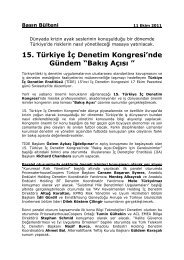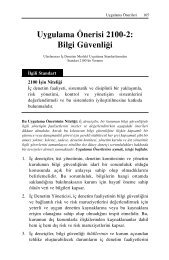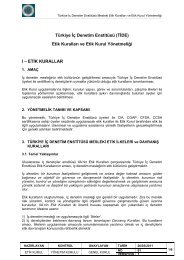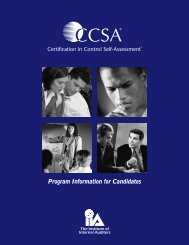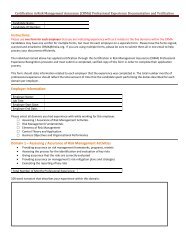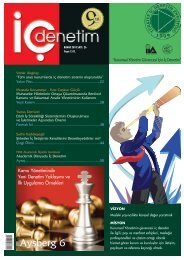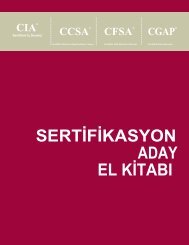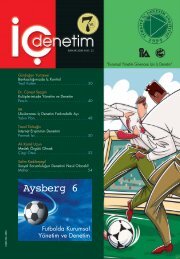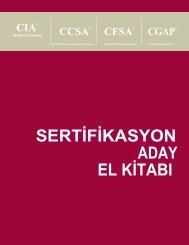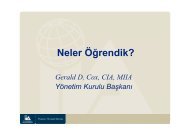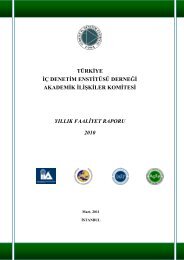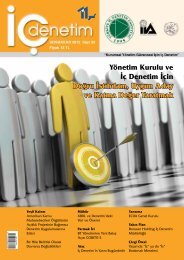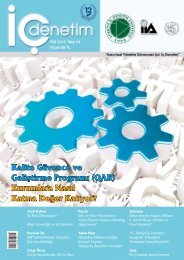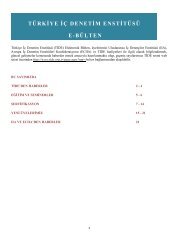04177 CFSA BROCHURE.qxd - TÄ°DE
04177 CFSA BROCHURE.qxd - TÄ°DE
04177 CFSA BROCHURE.qxd - TÄ°DE
- No tags were found...
Create successful ePaper yourself
Turn your PDF publications into a flip-book with our unique Google optimized e-Paper software.
The Institute of Internal Auditors Code of EthicsIntroductionThe purpose of The Institute’s Code of Ethics isto promote an ethical culture in the profession ofinternal auditing.Internal auditing is an independent, objective assuranceand consulting activity designed to add valueand improve an organization’s operations. It helpsan organization accomplish its objectives by bringinga systematic, disciplined approach to evaluate andimprove the effectiveness of risk management, control,and governance processes.A code of ethics is necessary and appropriate for theprofession of internal auditing, founded as it is onthe trust placed in its objective assurance about riskmanagement, control, and governance.The Institute’s Code of Ethics extends beyond thedefinition of internal auditing to include two essentialcomponents:1. Principles that are relevant to the professionand practice of internal auditing;2. Rules of Conduct that describe behavior normsexpected of internal auditors.These rules are an aid to interpreting the Principlesinto practical applications and are intended to guidethe ethical conduct of internal auditors. The Code ofEthics together with The Institute’s ProfessionalPractices Framework and other relevant Institutepronouncements provide guidance to internal auditorsserving others. “Internal auditors” refers to Institutemembers, recipients of or candidates for IIA professionalcertifications, and those who provide internalauditing services within the definition of internalauditing.Applicability and EnforcementThis Code of Ethics applies to both individuals andentities that provide internal auditing services. ForInstitute members and recipients of or candidates forIIA professional certifications, breaches of the Codeof Ethics will be evaluated and administered accordingto The Institute’s Bylaws and AdministrativeGuidelines. The fact that a particular conduct is notmentioned in the Rules of Conduct does not prevent itfrom being unacceptable or discreditable, and therefore,the member, certification holder, or candidatecan be liable for disciplinary action.PrinciplesInternal auditors are expected to apply and uphold thefollowing principles:IntegrityThe integrity of internal auditors establishes trust andthus provides the basis for reliance on their judgment.ObjectivityInternal auditors exhibit the highest level of professionalobjectivity in gathering, evaluating, and communicatinginformation about the activity or processbeing examined. Internal auditors make a balancedassessment of all the relevant circumstances and arenot unduly influenced by their own interests or byothers in forming judgments.ConfidentialityInternal auditors respect the value and ownership ofinformation they receive and do not disclose informationwithout appropriate authority unless there is alegal or professional obligation to do so.CompetencyInternal auditors apply the knowledge, skills, andexperience needed in the performance of internalauditing services.Rules of Conduct1. IntegrityInternal auditors:1.1. Shall perform their work with honesty, diligence,and responsibility.1.2. Shall observe the law and make disclosuresexpected by the law and the profession.1.3. Shall not knowingly be a party to any illegalactivity, or engage in acts that are discreditable to theprofession of internal auditing or to the organization.1.4. Shall respect and contribute to the legitimate andethical objectives of the organization.2. ObjectivityInternal auditors:2.1. Shall not participate in any activity or relationshipthat may impair or be presumed to impair theirunbiased assessment. This participation includes thoseactivities or relationships that may be in conflict withthe interests of the organization.2.2 Shall not accept anything that may impair or bepresumed to impair their professional judgment.2.3 Shall disclose all material facts known to themthat, if not disclosed, may distort the reporting ofactivities under review.3. ConfidentialityInternal auditors:3.1 Shall be prudent in the use and protection ofinformation acquired in the course of their duties.3.2 Shall not use information for any personal gain orin any manner that would be contrary to the law ordetrimental to the legitimate and ethical objectives ofthe organization.4. CompetencyInternal auditors:4.1. Shall engage only in those services for whichthey have the necessary knowledge, skills, andexperience.4.2 Shall perform internal auditing services in accordancewith the Standards for the Professional Practiceof Internal Auditing.4.3 Shall continually improve their proficiency andthe effectiveness and quality of their services.19 Register Today! Online: Visit “Certification” at www.theiia.org



